- Home
- Steve Erickson
Amnesiascope Page 2
Amnesiascope Read online
Page 2
Slipping from Ocean Time Zone into Oblivion Time, I reset the car’s clock back eleven minutes. Sahara grumbles about the situation all the way up Pacific Coast Highway; when her hostility toward me is finally exhausted, she goes into a monologue about her life in general—all the usual stuff about her mother who committed suicide, her homosexual brother who died last year, the rock band she’s trying to start in Los Angeles. … Soon Sahara’s mystique lies all over the car in tatters. Viv, in her fashion, entirely misses the depressing part of the evening and wakes silently with the first light of sun; one minute I look and she’s asleep and the next minute she’s awake, sitting up in the seat quietly watching the ocean out the window, still perfectly naked and content to remain that way for a while. “Stop and get some juice” are her first words of greeting, and I pull over to a little market. I get out and peer at them together in the back seat. Would you like something to eat? I ask Sahara.
“Bastard,” she mumbles in response, under her breath.
“She’ll be OK,” Viv coolly explains. “I’ve assured her that when the time comes, she and I will have our revenge.”
They’ll have their revenge! In their eyes I’m responsible for the whole plot. I could point out it was Viv who defiled Sahara all night in the back of the car while I was just the chauffeur; but what’s the use? There’s no use being reasonable here: “What’s reason got to do with it?” Viv would say. It’s as useful as arguing about the shape of a circle. “What’s round got to do with it?” The thing for me now is to just get them their food, get back in the car, and take them somewhere I can leave them to their unholy alliance. The thing for me now is to just quietly spend the rest of my life watching over my shoulder or out the corner of my eye, on my guard for the inevitable coming vengeance, and not waste two seconds trying to be reasonable about it, since I’ve finally learned, halfway or so through this life of mine, that with women there’s no percentage at all in reasonableness. And ever since I got this through my thick head I’ve gotten along with them a lot better.
Right now Viv can see all these thoughts flashing behind my eyes and, smiling, she reaches up through the car window and kisses me on the cheek. … So I’m not so surprised to get back to the car three minutes later, with their juice and an armful of those little processed sweet rolls in plastic packs, and find the back seat empty, and the two of them nowhere to be seen, their clothes still in a pile on the seat as they have been all night. I turn looking up and down the coast highway for a glimpse of them—but nothing; you tell me where a naked stripper and a sculptor dressed only in white garters and white stockings could disappear to, because I’ll never know. Later when I find Viv I’ll ask her and she’ll just give me the same little smile she gave me when she kissed me through the car window. I suppose, all things considered, it was pretty shrewd of me when I went in the market to take along the car keys.
Couple of years ago, the newspaper I work for asked me to write a piece on the city’s “spiritual center.” I begged them not to make me. But, unavoidably coerced, I finally turned in an essay on another strip joint not far from the Cathode Flower, down on La Cienega Boulevard in the barren stretch where all the little art galleries used to be along with stores that sold Dutch clogs and designer hot dogs. It was across from the theater where Bertolt Brecht wrote plays for Charles Laughton before Brecht was run out of Hollywood in the early Fifties; last time I was there all I saw were the remains of the lingerie shop, lingerie of all colors and configurations blowing along the sidewalk like old newspapers. At this strip joint I had befriended a forlorn blonde stripper named Mona. “Befriended” is a misnomer, of course, since our friendship never existed outside a five-minute conversation now and then in the dark, and of course Mona was not her real name; I never knew her real name. She was from Stockholm and never seemed very happy. I always thought she was beautiful and sweet, but it was dark, after all. One night, as I knew would eventually happen, Mona was gone, as all these girls are eventually gone—and they don’t leave forwarding addresses, a rule that used to apply to strippers in particular but has recently come to apply to everyone in Los Angeles. … Now about an hour past dawn, after Viv has disappeared with Sahara, I turn off Sunset and head east through the Palisades thinking about Mona. The ocean is behind me and I take another turnoff toward this bluff I know where there’s a view of the whole bay, from the smoking ruins of Malibu to the paramilitary outposts of Palos Verdes. The sky is filled with the smoke of last night’s backfire along the second ring, and from the bluff looking east I can see two or three of the wide scorched concentric gashes that circle Los Angeles, with old Hollywood in the bull’s-eye.
With the car parked I run the radio up and down the dial one last time before finally shutting it off. In the distance below me, a last few tiny fire engines make their way back to the fire stations from the charred ring of earth. Out at sea the hundreds of Chinese junks that sail in about this time each month approach the shore with their mystery cargo. My article identifying the spiritual center of Los Angeles, incidentally, was never published, the only story I’ve written in a long time that was flatly rejected and which I flatly refused to rewrite. The sun has risen just high enough to come crashing through my front windshield when I’m still thinking of Mona who, for all I know, is hanging out at this very moment with Viv and Sahara, or was abducted according to the plan scribbled on a cocktail napkin and is now held captive in the Scandinavian fjords, near the top of the world.
I started talking to myself again the other day. I don’t think I even realized I was doing it, until I noticed the woman in the next car looking over at me in horror. … Since the Quake I haven’t talked to myself like I used to—in the shower, pacing my apartment, in the car or walking down the street, yakking up a storm in broad daylight and never thinking twice about it. The plain truth is I’ve never known anyone else I was so confident would be as understanding of what I had to say, or as patient to let me say it; if nothing else I could always be sure I would at least let me finish my sentence, before interrupting. Some years ago I mentioned it to a woman I was seeing at the time. It wasn’t so much a confession, since I didn’t think it was anything to confess; it just sort of came up in passing: “Well, yes, now and then I talk to myself. No, I don’t mean in my head, I mean right out loud.” We were at the beach, lying on the sand. She grew increasingly sullen the rest of the day and evening, until finally she admitted it seemed to her a pretty distinct sign of instability. In fact she had to admit it seemed to her a pretty distinct sign I was flat-out cracked; and she was right, of course, I’ve never denied it. I’ve never denied the deep fault line running from my psyche through my brain out my door and down Jacob Hamblin Road, straight to Melrose Avenue and the feet of Justine.
Actually it was Justine who got me talking in the car in the first place, though I don’t remember exactly what I was saying to her. I was driving east on Melrose when I saw her rise before me on the other side of Fairfax, having just appeared a block or two behind me and altogether likely to manifest herself again on some other street several miles from here, some time in the next hour or two, if not sooner. She hovered high above the avenue as she always does. … Justine is a billboard. She’s everywhere lately, an eruption of flesh, sprawled across a silk sheet in barely existent red panties and tassels that match her red hair, under a scrawl in red lipstick that reads Justine. Her breasts, pink luscious bubbles floating over the cityscape, cannot be called merely spectacular, they are supernatural, eternal like the woman herself, who was first revealed some twenty years ago on billboards just like the ones she’s on now, in a similar pose, her body slightly less pneumatic as though she was ripening at the speed of her own legend. Ten years later she reappeared up and down the Sunset Strip, Hollywood Boulevard, La Cienega Boulevard … and now she’s reappeared yet again. No one knows exactly what Justine does, or what she’s advertising for, I assume she doesn’t actually do anything, though there’s a phone number at the bottom of the billboard fo
r anyone interested in finding out. But as the years have gone by, with Justine bursting forth new and better each decade, ever more perfect and ubiquitous, it becomes less and less imperative that she do anything at all but watch over the city as the Red Angel of Los Angeles, from block to block and street to street and billboard to billboard and year to year. Nonetheless, I make note of the phone number anyway.
I don’t have to write it down, because in the L.A. of Numbers I am Memory Central, just as in the L.A. of Names I am Memory Void. I seem not to be able to remember any thing or any one anymore, and I guess I’ve insulted a few people in the process; I run into somebody here or there and he starts jabbering at me and pretty soon I realize I’m supposed to know this person, I’ve met him before, maybe ten or twenty times, maybe a hundred. And after he goes on awhile I can finally only look him straight in the eye and say, “Excuse me, but who are you?” and then he’s not too happy about it. But at the same time that I’ve cut myself loose of memories of people and events, the memories of dates and times and phone numbers attach themselves to my brain like gnats to fly paper. At the same time that I’m the deep well into which one can drop a bad love affair, a death, a childhood trauma and never see it again, never even hearing it hit bottom, assuming there is a bottom, I remember not only my own dates and times and phone numbers, but yours too. I’m a walking Filofax for everyone’s appointments and vital statistics. I remind Viv of her lunch date at this gallery or that studio, I let my friend Ventura know when it’s time to pick up his laundry. I’m the man of deadlines and itineraries and bank account codes; even Carl in New York calls in to check his schedule for the afternoon. So remembering Justine’s phone number, written so inconspicuously at the bottom of the billboard that I have to figure she would really rather not hear from me at all, is a snap. I don’t even have to repeat it to myself out loud. Instead, with the woman in the next car looking aghast that the man in the car next to her is having an unduly animated dialogue with no apparent passenger, I figure maybe I should put a lid on it again, no more talking to myself. I’m beyond the point anyway where, even to myself, I really have all that much to say. …
Over the two days I spent moving into my new suite, I panicked. Not about the extra rent but because, situated in this apartment, in the big wide open front room with all the windows, I might be generally expected by others to become more productive, even inspired. I have no intention of becoming either inspired or productive; to the contrary I intend to sit in the dark at night in my big black leather chair staring out at the Hollywood Hills like a man gazing on an approaching tsunami. Here comes the present. On my monitor I run the same movies over and over with the sound off: The Bad and the Beautiful, Out of the Past, Pandora’s Box, I Walked with a Zombie. Studying the films on my shelf, Ventura remarks that I don’t own any funny ones. “What the hell are you talking about?” I answer in outrage. “You don’t think Scarlet Empress is a funny movie? You don’t think Detour is a funny movie?” Last time I was up the hall in Ventura’s apartment I took a look at his film shelf, and there’s a guy who doesn’t own a single funny movie—except Charlie Chaplin, and he and I both know he doesn’t watch City Lights because he thinks it’s funny, he watches it because he thinks it’s profound. The truth is I don’t own anything but funny movies. Every one of them is hysterical.
On the walls of his apartment Ventura tacks little sayings written on paper, maxims he’s scribbled from his readings, words of wisdom. He even has up there one or two things I’ve said. Starting at one end of his apartment and reading to the other, one comes away with a sum total of the Twentieth Century that’s rather different from what the century itself might have concluded. Ventura has been having a dispute with the Twentieth Century, and now that it’s over he just goes on disputing it, first the century and then the whole millennium. Ventura’s whole life is a dispute with the Twentieth Century and I’m the moderator, the referee. I watch for the low blows, the groin kicks, the cheap shots, while trying not to get belted myself in the process. I’m neutral not only on the century and the millennium but on God himself; let’s just say I’m reserving judgment. … Over the years Ventura and I each move from one apartment to the next in the Hamblin, trying to better situate ourselves, though for what I have no idea. He moves up the hall as I move down; he used to be in a larger apartment and moved to a smaller one, before I moved from my smaller apartment to the larger one. As he moves to smaller spaces he accumulates more and more pearls of wisdom on paper until there’s no more room on any more walls, at which point he begins to layer over: he never throws anything out, God forbid. Just once I’d like to see him throw something out, one of these little pearls of wisdom scribbled on paper, just so I could see which one it was; I wouldn’t even mind if it was mine. When the universe stops expanding and starts contracting, Ventura will start eliminating all these revelations until there’s only one left—and that’s the one I want to read. That’s the one I want to take with me to my grave.
As for me, as I move to larger spaces I get rid of more things. I lose things as the universe expands; I’ll start accumulating when the universe contracts. There you have it in a cosmic nutshell, the difference between me and Ventura. Soon he’ll be living in a closet with more paper than the Library of Congress, and I’ll be living on the roof naked in my black leather chair. This morning when I go up the hall to see him he’s staring at his tarot, dealt out on the floor in the shape of a cross. He’s contemplating the meaning of the Queen of Cups, at the nexus of the cross. On the broken-down table that stands in the middle of his ever-shrinking apartment is the usual volume of mail he receives for the column he writes for the newspaper. Ventura’s sense of purpose is such that he will answer all these letters; he’s been writing the column since the first issue of the newspaper almost fifteen years ago. But now, between his fan letters and his empty typewriter, sitting in his fedora and his cowboy boots and the same shirt that’s always rolled up at the sleeves, he stares at the Queen of Cups. He almost always wears his fedora and cowboy boots, even in his own apartment; only very occasionally does he take off the hat, and every once in a while, if he’s feeling really familiar, he may even be seen in his socks. Staring at the Queen of Cups, he’s wondering who she is. He’s wondering if she’s his ex-wife or his current girlfriend or the woman who was his last girlfriend and may be his next. One of the most enduring and gratifying things about my friendship with Ventura is that when it comes to women, he’s even more screwed up than I am, the best and most compelling evidence of which is that he actually thinks I’m more screwed up than he is. “I’m not going to ask,” he says, “what it is they want. You haven’t heard me ask that.”
“No.”
“I wouldn’t dream of asking.”
“Oh, go ahead,” I say.
“No,” he shakes his head, “I wouldn’t think of it. It wouldn’t even occur to me.”
“Actually, it’s easy.”
“What?”
“It’s easy. What they want. It’s the easiest question in the world.”
“It is?” For a moment he’s alarmed. “All right, so … tell me.”
“Everything.”
“What?”
“They want everything.”
An ashen look comes over his face. “Then we’re fucked,” he says hopelessly. Ventura is so confused about women that when I explain to him my Three Laws of Women, he actually writes them down. “One,” I count off, “they’re different.”
“One, they’re different,” he repeats, jotting it down in his little notebook. He always carries a little notebook where he jots things down, so he can write about them in his column or tack them up on his wall.
“Two, they’re crazy.”
“Two, they’re crazy.” Scribble scribble.
“Three, they’re funny.”
“Three, they’re funny.” He reads it over. Ventura is convinced every woman is irresistibly attracted to him. “That woman’s looking at me,” he moans in a restaur
ant, “I wish she would stop. I have too many women in my life right now.” Every woman in every restaurant, every woman on the street, every woman who exchanges two syllables or a burp with him, wants him. It’s his burden in life to disappoint all of them. The ones he doesn’t disappoint sooner, he’ll have to disappoint later. Those are the ones he becomes involved with, the ones he casts in the movie he thinks he’s living in; like him, they’re larger than life. Each affair is a singular turbulent drama. “You two don’t have a relationship,” Viv said to Ventura one night at Musso and Franks, about one girlfriend or another, “you have a weather report.” Lately I’ve been noticing something. Every woman in Ventura’s life gets larger and more mythic than the last, until the new one is the most remarkable of all, the smartest and most beautiful, the one who in another world was a movie star and is now reincarnated as a Sufi goddess—and then he breaks up with her, as always, for no reason I can fathom. He just broke up with one recently for the simple reason that there was absolutely nothing wrong with her; she was a woman with no vices whatsoever. “How was I supposed to be involved,” he asks plaintively, “with a woman who has no vices?”
“You don’t understand,” I tell him. “You were her vice.”
“That’s it! That’s it exactly! I was her vice. How was I supposed to be involved with a woman whose only vice was me?” Weeks from now, of course, if not days, he’ll regret it. “I was driving out of the desert,” he’ll explain, pacing his apartment in a frenzy, “when it hit me like a lightning bolt,” and he’ll hit the back of his head, nearly knocking off his hat, to show me what it was like to be struck by this epiphany: “I should have married the Sufi goddess.”
“Do you know,” I finally confess to him, “that in all the years I’ve known you, I’ve never understood a single thing about any of your relationships with any of your women? That in fact I understand your relationships with women even less than I understand mine? That’s not the way it’s supposed to work. Other people’s fucked-up relationships are supposed to be easier to understand than your own. I’ll bet,” I pointed out, “that you think my relationships are easier to understand than yours.”

 ARC D’X
ARC D’X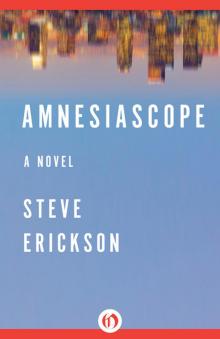 Amnesiascope
Amnesiascope Our Ecstatic Days
Our Ecstatic Days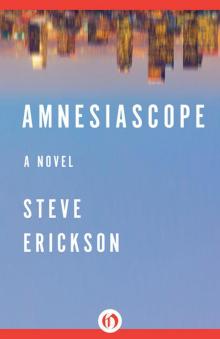 Amnesiascope: A Novel
Amnesiascope: A Novel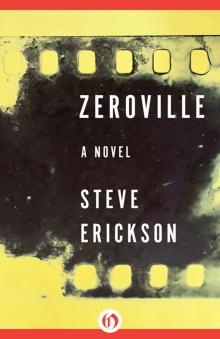 Zeroville
Zeroville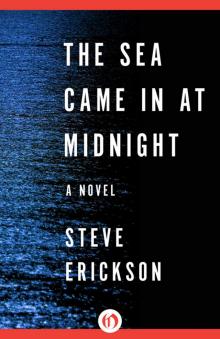 The Sea Came in at Midnight
The Sea Came in at Midnight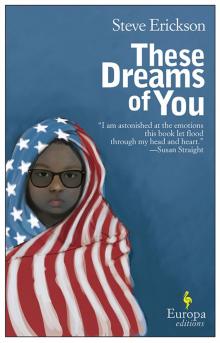 These Dreams of You
These Dreams of You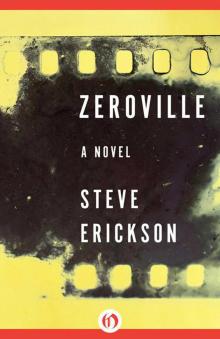 Zeroville: A Novel
Zeroville: A Novel Days Between Stations
Days Between Stations (1993) Arc d'X
(1993) Arc d'X Full-Blooded Fantasy
Full-Blooded Fantasy